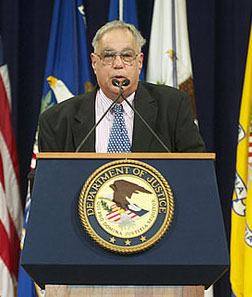During Chicago’s recent mayoral campaign, the Chicago Tribune published an article on the career of candidate Lori Lightfoot, a lawyer.
The article recounted, among other details, an incident when Lightfoot, serving in 1999 as an Assistant United States Attorney, allegedly misled a federal judge. This resulted in her later reprimand by another federal judge, U.S. Circuit Court Judge Richard Posner.
In her defense, Lightfoot explained that the incident occurred when she was “a junior lawyer following the advice of people who were much more experienced than me [sic],” and that a U.S. Department of Justice inquiry had determined that she had not “engaged in professional misconduct or exercised poor judgment.”
In response to the Tribune’s article, Scott Cisek, a senior aide to Lightfoot’s opponent Toni Preckwinkle, posted on Facebook a photograph of nine former Nazis sitting in the dock as defendants before the International Military Tribunal at Nuremberg during 1945-46. The photo had a top caption ” ‘JUST FOLLOWING ORDERS’ ” and, at bottom, “HISTORICALLY THAT EXCUSE HASN’T WORKED OUT SO WELL.”
Over the line? Top political advisor for @toniforchicago, Scott Cisek, posts a picture of nazis and the Nuremberg Trials to reference a story about @LightfootForChi being reprimanded by a federal Appeals Court Judge when she was a federal prosecutor. pic.twitter.com/VaSmAEru7O
— Paris Schutz (@paschutz) February 21, 2019
Cisek soon deleted his post and apologized.
Preckwinkle fired Cisek from her campaign.
Lightfoot, in the end, defeated Preckwinkle.
The enormous crimes of true Nazis, as proven and adjudicated in the Nuremberg trials, are matters to study, learn, and teach, with accuracy and a sense of proportion.


